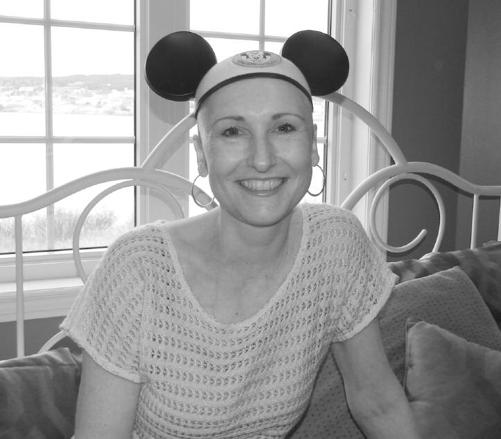100 Perks of Having Cancer: Plus 100 Health Tips for Surviving It (21 page)
Read 100 Perks of Having Cancer: Plus 100 Health Tips for Surviving It Online
Authors: Florence Strang
Tags: #Health; Fitness & Dieting, #Diseases & Physical Ailments, #Internal Medicine, #Oncology, #Cancer, #Medicine & Health Sciences, #Clinical, #Medical Books, #Alternative Medicine, #Medicine

in your home to
term exposure increases cancer risk. The lung cancer risk is much
identify a serious
higher in those who are exposed to radon
and
who smoke.
lung cancer risk.
Going outside at night to see if your house is the one glowing
in the dark is not the way to detect radioactive radon. The only
way to find out if your home is radioactive is to get a radon test kit. Because
radon levels can vary with things like the weather, testing needs to be over
a period of time. Some tests measure the radon for up to ninety days and
store the information so it can then be sent to a lab to be analyzed. You
can also have a professional test your home. It is estimated that in the
United States, one out of fifteen homes has unhealthy radon levels.
To fix the problem, the cracks or openings allowing the radon to enter
your home are sealed. There are companies that specialize in this type of
work.
Unlike your obnoxious Aunt Gladys, radon is one houseguest you don’t
have to tolerate. For more information go to www.epa.gov/radon or
www.hc-sc.gc.ca and search “radon.”




Perk #18
People Were Nicer to Me
W
hen people found out I had cancer,
EVERYONE suddenly became nicer to
me! Friends and family came out of the
woodwork to cook, clean, and help out
with the kids. This was especially the case
after I lost my hair and began to “look” the
part of a cancer patient. As an added bonus,
when I wore a hat or other headdress that
gave away my baldness, even strangers were
super nice to me, giving up their parking
spots, letting me go ahead of them in lines,
and dishing out the compliments like crazy.
For a while there, I thought every guy in the
Goofing around with my baldness.
supermarket was hitting on me. But alas, it
wasn’t me; it was my bandana that was attracting the attention.
I will admit, though, at first I did not appreciate all of that attention. I
felt as though people were looking at me with pity, and the last thing I
wanted was to be pitied! One day while lined up at the supermarket check-
out, I had a conversation that changed my perspective. An older gentleman
very nicely asked about my condition and then proceeded to
tell me about his wife who had been diagnosed with breast
cancer twenty years earlier and was still doing well. He wished
Nearly everyone has
me all the best and said that he would pray for my recovery.
their own story of
What I recognized in this man was not pity, but rather
how cancer affected
empathy. Because of his own experience with cancer, he could
their lives, which
sympathize with mine. Following that conversation, when I
allows them to
noticed people looking at me differently, I no longer felt as if
empathize with yours.
I was being pitied. Instead, I considered that those people
might have had their own story of how cancer affected their lives, which
allowed them to relate to mine. They really were just being nice.
I 79 J

80
100 Perks of Having Cancer
HEALTH TIP #18
It’s Nice to Be Nice . . . to the Nice
C
an being nice to someone actually be healthy? According to several stud-
ies, and the authors of the book,
The Healing Power of Doing Good,
the
answer is yes!
There are actually researchers who study the effects of kind acts on health
and well-being. They find, time after time, that being good is good for you.
When you are helping someone else, you are unable to focus on yourself
and your own stress-provoking thought patterns. This breaks the stress cycle
and allows your body to relax and focus on just that one thing. Helping, in
some cases, is like a form of meditation.
Some of the positive effects of lending a hand are:
●
Getting a “helper’s high,” which is a rush of euphoria followed by calm-
ness similar to the effects of meditation. This produces the same kind of
endorphins (our body’s natural painkiller and feel-good chemicals) that
you get with exercise. (A runner’s high without the run!)
●
reducing feelings of despair and isolation by providing hope, not just to
the one helped, but to you as well
●
improving depression and symptoms of depression, such as lethargy,
insomnia, and chronic pain
●
increasing your immune response
You can also choose to be a volunteer in an organization to help a group
of others. Volunteering in a group setting has the extra benefits of:
●
increasing social and relationship skills by connecting with others in a pos-
itive setting (Who knows, you might even meet your special someone!)
●
helping you to be more outgoing
●
increasing self-confidence
●
showing your kids that you can make a positive change with your actions
when volunteering as a family
Perk #18: People Were Nicer to Me
81
●
learning job skills and improving your career (Habitat for Humanity
taught me how to use a nail gun without shooting myself in the foot.)
●
providing fun and fulfillment (When volunteering at a community gar-
den, you literally get to “reap” the benefits of your work.)
It’s hard to allow people to do things for you. When I was in the
midst of my chemo treatment, accepting help meant admitting I
You don’t need
needed
help. I was raised to be self-sufficient and self-reliant and tak-
an excuse to be
ing help meant I was “weak” and “needy.” But I realized (very
nice, but getting
quickly) how nice it was to have that hot meal ready or get my gro-
healthier is a
ceries delivered to my front door. It was not only nice—it was needed.
nice one!
And that didn’t make me weak or needy. It just made me human.
By allowing people to be nice to you, you are actually doing THEM a
favor. Now consider the many ways you can be nice to others by allowing
them to be nice to you. The next time someone says, “Let me know if there
is anything I can do to help,” have your list ready:
❏
Cook a meal.
❏
Drive you to and from
appointments.
❏
Help with housework.
❏
Sit with you through a chemo.
❏
Watch your kids for a while.
❏
Pick up groceries.
❏
Pick up prescriptions.
❏
Pick up your mail.
❏
Mow your lawn.
❏
Run errands.
❏
Walk your dog.
Allowing others to help is helpful in more ways than you realize.
For more information on the specifics of feeling good while doing
good, check out
The Healing Power of Doing Good: The Health
and Spiritual Benefits of Helping Others,
by Allan Luks and Peggy
Payne [iUniverse.com, Inc., 2001].


